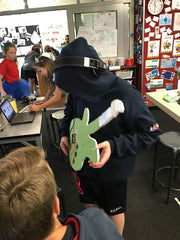Sarah says, “In my classroom, Micro:bits are an instant ‘go to’ for teaching Digital Technologies. The Micro:bit’s allow me to teach my Year 7 and 8 students computational thinking (CT) and programming. They have the flexibility to integrate with other Technological areas, including Soft materials, Hard materials, and Electronics to deepen learning in a variety of NZC Technology strands.”
Sarah teaches CT concepts with unplugged activities first. She then supports that with instructive tutorials for the Micro:bit using MakeCode. Her students use the knowledge gained and follow a design process to create technological outcomes for real needs or support other curriculum subjects, like Music, Science and Mathematics. The ability to add more components, like motors and sensors, allows her students to make scientific experiments, interactive games and programmable robotics.
 |
 |
 |
|
Interactive board games |
Radio communications |
Making Instruments |
She has found e-textiles are also a fantastic way to introduce simple tech systems that can move up to being programmable. Here is an example she made to inspire her students.
|
Photo: |
Sarah specialises as a technology teacher at the Remarkable Primary School in beautiful Queenstown. So, we shouldn’t be surprised by her remarkable performance as a teacher! In 2019 she won the TENA outstanding technology teacher award. But she didn’t stop there. In 2020 she won the Prime ministers science teacher award and in 2021 she is a finalist for the Gerard MacManus award for excellence in IT Education. Sarah is also a committee member on both TENZ and DTTA. |














Leave a comment (all fields required)